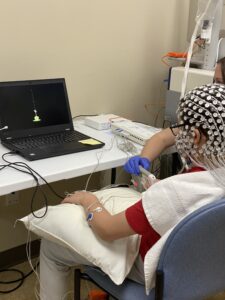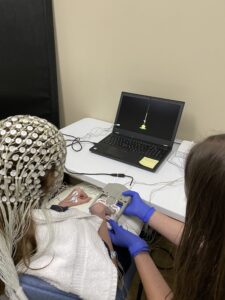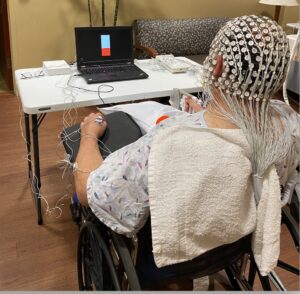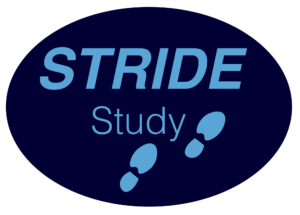Research
Welcome to the Cassidy Plasticity Lab! We are a growing research team focused on brain plasticity across the lifespan. We use structural and functional neuroimaging, electroencephalography (EEG), and neurostimulation to investigate relationships between brain and motor behavior during development, injury, disease, and rehabilitation.
Would you like to be contacted about future study opportunities? If so, please contact us at CassidyLab@unc.edu to be added to our research registry.
EEG in Children with Hemiplegia for Biomarker Development:
The EMBARK Study
This is a study funded by the American Academy of Cerebral Palsy and Developmental Medicine (AACPDM) and the NIH (National Pediatric Rehabilitation Resource Center, C-PROGRESS) that entails the collection of brain and muscle signals using electroencephalography (EEG) and electromyography to provide a more detailed characterization of sensorimotor impairment in children 7-17 years of age with unilateral cerebral palsy.


Brain Network Connectivity Measures in Early Stroke Rehabilitation

This NIH-funded R00 study involves the development of Neuroimaging-based biomarkers to enhance the prediction of post-stroke motor recovery. This project will also examine how individual factors like attention, mood, and self-efficacy influence motor recovery prediction.
Stroke Management Training and Inpatient Rehabilitation Discharge Education (STRIDE)

This 1-year pilot study funded by the University Center for Health Innovation introduces a unique and innovative program utilizing commercially available activity monitors, social support, and education to address the lack of structure and support often encountered immediately following hospital discharge. Our program targets individuals that have experienced a stroke that are preparing to discharge to home from the acute inpatient rehabilitation unit at UNC Hospital.
Over the course of three months, participants will:
- Monitor and document their physical activity,
- Maintain correspondence with their STRIDE buddy (another STRIDE participant), and
- Complete educational modules addressing a variety of relevant topics promoting wellness across multiple dimensions.
The purpose of this program is to instill accountability, motivation, and engagement in one’s health and post-stroke recovery through the maintenance of physical activity and peer communication.
Impact of Covid-19 on Rehabilitation Care: A Clinician’s Perspective
This research study investigated the impact of the Covid-19 pandemic on physical, occupational, and speech therapists providing care at UNC Hospital using a combination of questionnaires and interviews to best capture their insight and experience.